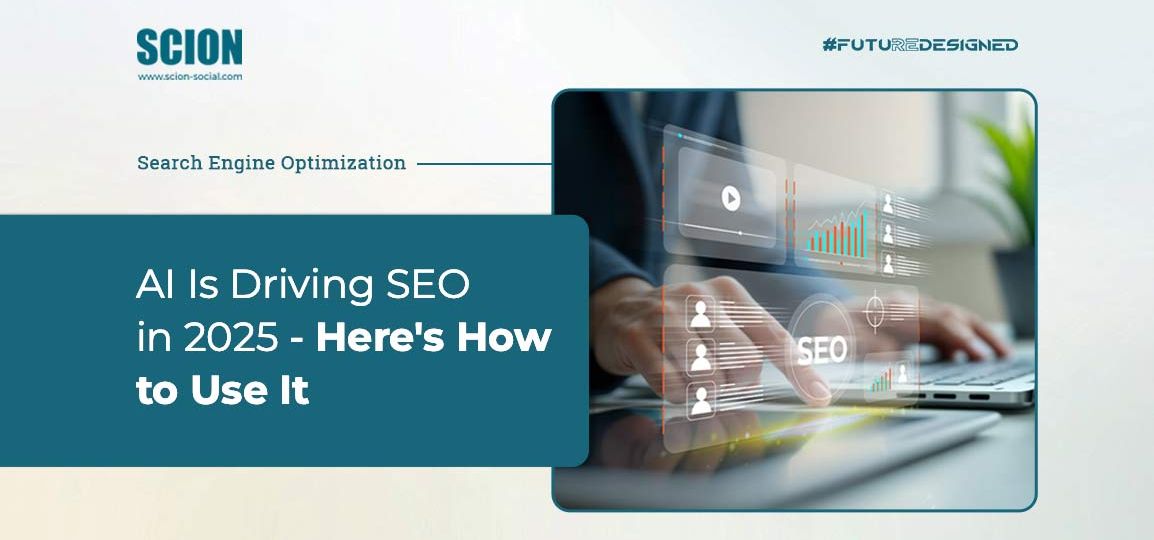
Google is no longer just a search engine. It’s becoming an AI-powered assistant. With features like AI Overviews, Deep Search, and Gemini’s “AI Mode,” it’s not just pointing users to answers – it’s giving them the answers and, sometimes, is even acting on their behalf.
So, here’s the new reality: you’re not just trying to rank anymore – you’re trying to be referenced and trusted by AI.
What does this mean for you?
That to stand out, your content must:
- Be built around real questions that people ask
- Be rich in insights and avoid fluff
- Be clearly structured so that AI can understand and pull from it
- Be authored by humans, even if AI helps draft it
Clicks are no longer the only goal. It’s about engagement, trust, and being the source that AI turns to. We’re not optimizing for algorithms anymore; instead, we’re creators for the AI assistants that your audience already trusts.
And brands that adapt quickly won’t just survive – they’ll be the ones leading the next chapter of discovery. In this guide, you’ll find out how AI tools are defining the future of SEO, which tools to try, and how to use them to get better Google rankings.
Why Google Ranking Matters More Than Ever
Google still owns search. If you’re not showing up on the first page, your chances of getting organic traffic drop dramatically.
SEO has evolved far beyond keyword stuffing and backlink chasing. Google’s algorithm is now smarter than ever, thanks to advances in machine learning and natural language processing. This shift means that high rankings are no longer just about technical tricks – they’re about delivering genuine value to users.
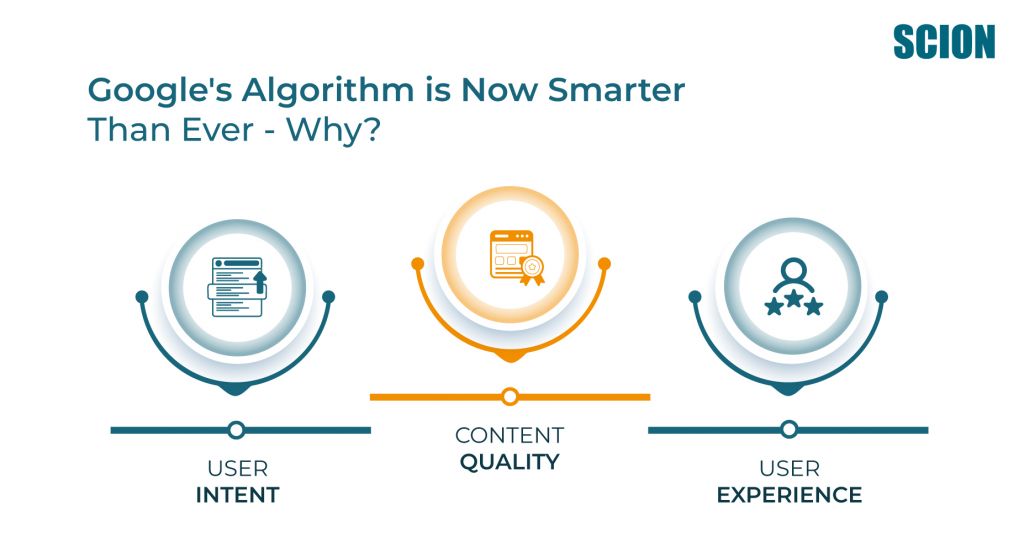
Google’s algorithm now focuses on:
- User intent: Ranking well now requires a deep understanding of why someone is searching, not just what they’re searching for. Are they looking to buy? Learn? Compare? Google’s smarter algorithm can tell, and it ranks content accordingly.
- Content quality: Google’s algorithm now understands context, meaning, and nuance. With models like BERT and MUM, it can evaluate content much like a human would. That means:
- Thin, keyword-stuffed pages are penalized
- Helpful, in-depth content that answers real questions is rewarded
- Topical relevance and richness matter more than exact-match keywords
- User experience: Google measures how users interact with your content. Factors like page speed, mobile responsiveness, Core Web Vitals (LCP, FID, CLS), time spent on the site, and bounce rate all influence how your site ranks.
To stay competitive, you need smarter tools – and that’s where AI comes in.
How AI Is Changing the SEO Game
AI isn’t just a helpful add-on to your SEO strategy – it’s becoming the engine behind more efficient, data-driven, and impactful optimization.
And SEO isn’t just about Google anymore. Users search on many different platforms including YouTube, LinkedIn, TikTok, and ChatGPT. This shift toward Search Everywhere Optimization means your content needs to be easy to find across platforms.
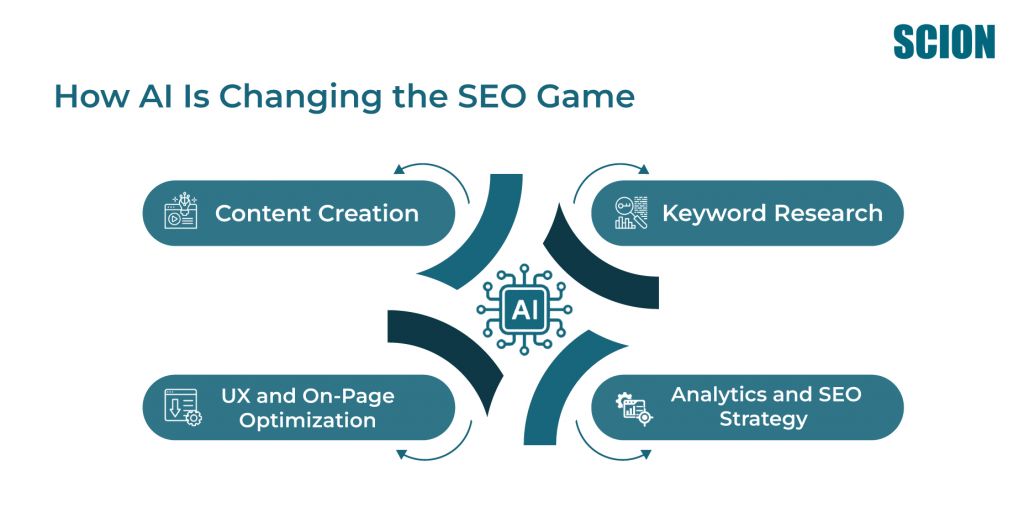
With the help of modern AI tools, every step – from content to UX – becomes more efficient, more accurate, and more aligned with how Google ranks content today. Here’s how AI tools can help improve the four main pillars of SEO:
1. Content Creation
Creating high-quality, search-friendly content at scale used to be time-consuming, but with AI, it’s now quick and intelligent.
- ChatGPT: Perfect for brainstorming topics, generating outlines, writing intros, and even full content drafts. It excels at creating engaging, readable content tailored to user intent.
- Jasper: Built for marketers and copywriters, Jasper uses AI to create conversion-friendly blog posts, landing pages, and ad copy. It includes SEO mode integrations that help you optimize while you write.
- Frase: Focused on SEO-first writing, Frase helps you research a topic, pull SERP data, and generate well-structured, optimized articles that cover what competitors are ranking for.
- SurferSEO: Integrates with both Jasper and Google Docs to provide live optimization suggestions. It analyzes top-ranking pages and generates keywords, structure, and content length recommendations in real time.
How this helps SEO: These tools drastically reduce content creation time while improving topical relevance, keyword usage, and completeness – all critical for satisfying Google’s smarter content evaluation algorithms.
2. Keyword Research
Keyword research is no longer just about volume – it’s about understanding intent and finding opportunities where you can convert.
- SEMrush AI: Goes beyond traditional keyword data by identifying intent-based clusters, competitive gaps, and even emerging topics using machine learning models. The Keyword Magic Tool now uses AI to group and prioritize keywords for faster decision-making.
- ChatGPT: Use it to classify keyword intent, brainstorm long-tail variants, or summarize SERP patterns. It’s also great for transforming keyword lists into usable clusters based on themes.
How this helps SEO: With AI tools, you can move from a list of keywords to an intent-driven strategy, targeting queries that align with your funnel and match what users are really looking for. Find out more about using generative AI for keyword strategy in this blog.
3. UX & On-Page Optimization
Google ranks websites that provide great user experiences, and AI can help you both detect problems and improve them intelligently.
- SurferSEO: Optimizes content structure for readability, keyword placement, and semantic depth – all factors that are tied to how users and search engines evaluate UX.
- Frase: Helps improve content scannability and structure using AI-driven outlines and formatting best practices. It will also show you what competitors include that you might be missing.
- ChatGPT: Use it to analyze user feedback, identify confusing navigation or layout issues, and even rewrite content for clarity and tone.
How this helps SEO: AI tools can help ensure that your content not only ranks but delights users, resulting in reduced bounce rates and improved engagement.
4. Analytics & SEO Strategy
Interpreting SEO performance used to take hours. Now, AI can monitor, analyze, and even make recommendations in minutes.
- SEMrush AI: Automates site audits, tracks ranking movements, and offers AI-generated insights to highlight what’s working and what’s not. It also recommends specific actions like which pages to update, or which keywords are losing traction.
- Frase & SurferSEO: These tools continuously evaluate your published content against the competition and recommend real-time improvements based on changing SERPs.
- ChatGPT: Excellent for synthesizing analytics reports, explaining trends, and generating strategic insights from data. You can even feed it GA4 exports and ask, “What’s underperforming and why?”.
How this helps SEO: With AI-driven analytics, you’re no longer reacting to data – you’re acting on it strategically and ahead of the curve.
Smarter Content Creation
Creating content that both ranks and resonates used to be a slow, manual process. Today, AI transforms the way we produce SEO-rich content, making it faster, more strategic, and far more scalable.
But here’s the catch: AI can’t and never will be able to replace unique human insights. Use it to structure and optimize – but never forget that the real value comes from your expertise.
Here’s your go-to list of SEO tools and how you can use each one to its maximum effectiveness:
AI-Driven Keyword Research
Find long-tail keywords, intent clusters, and competitor insights in minutes.
- SEMrush: Combines AI and search data to surface intent-based keywords, difficulty scores, and traffic potential. Great for competitive benchmarking and keyword clustering.
- Clearscope: Helps uncover semantically related keywords, so your content aligns with how Google understands topics.
- Ubersuggest AI: Offers AI-powered keyword ideas, trends, and SERP analysis in a beginner-friendly interface.
- SurferSEO: In addition to content optimization, Surfer suggests keyword variations, content length, and topic clusters based on SERP data. It’s especially useful when building keyword-rich outlines.
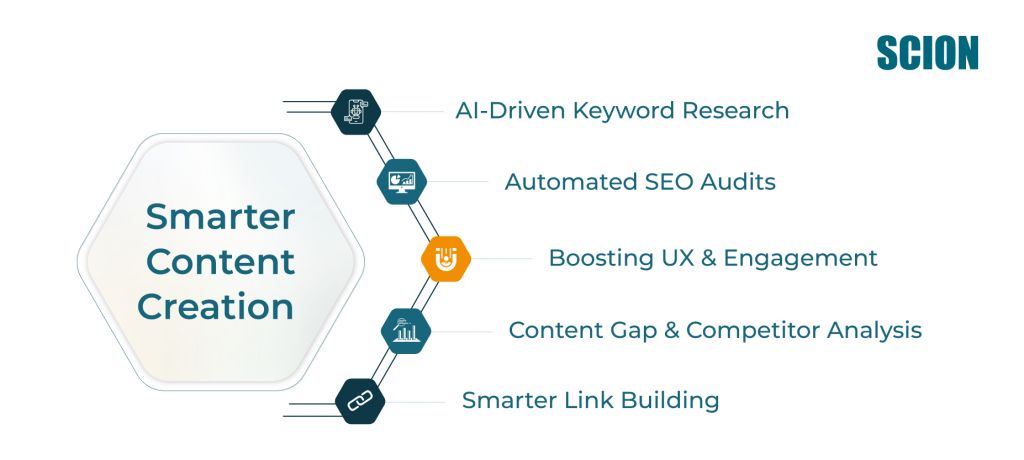
Automated SEO Audits
Use AI to detect technical SEO issues and receive prioritized recommendations for fixing them.
- Ahrefs: Their Site Audit tool is robust, reliable, and easy to scale. It crawls your site to uncover technical SEO issues such as broken links, redirect chains, thin content, and slow-loading pages. The real power lies in its ability to visualize crawl data and prioritize fixes based on SEO impact. With ongoing AI-driven enhancements, you get deeper insights into how issues affect your rankings and what to tackle first.
- Sitebulb: Offers visual crawl mapping and AI-generated suggestions for fixing site structure, duplicate content, and JavaScript rendering issues.
- Screaming Frog (with AI extensions): A flexible SEO crawler that can be enhanced with AI scripts to classify issues and automate data interpretation.
- SEMrush Audit: Provides automated technical reports with fix suggestions. It’s beginner-friendly and integrates seamlessly with SEMrush’s keyword and content tools.
- Jasper: While known for writing, Jasper also assists in identifying on-page SEO opportunities and rewriting metadata based on audit insights when paired with SurferSEO.
Boosting UX & Engagement
Use AI to understand user behavior and optimize layout, content flow, and interaction.
- Hotjar (with AI features): Tracks where users click, scroll, or bounce. AI identifies friction points, helping you improve layout and flow with precision.
- Google Optimize: A/B testing tool (now deprecated but foundational to newer GA4-based personalization tools) that helps improve on-site engagement.
- ChatGPT: Great for generating UX copy, testing different tone variations, or creating CTAs based on predicted user behavior.
- Jasper: Can write user-centric copy variations for different buyer personas or funnel stages. Ideal for testing CTAs, value propositions, or landing page intros.
Content Gap & Competitor Analysis
Find what your content is missing versus top-ranking competitors – and fix it fast.
- MarketMuse: Uses AI to analyze how well you’re covering a topic and shows what’s missing in your content strategy to establish topical authority.
- Frase: Breaks down SERP results into insights, pulling questions, subheadings, and themes that help you fill content gaps quickly.
- SurferSEO: Offers a comprehensive content score, competitive comparison, and recommendations on keyword density, structure, and word count, all based on live SERPs.
- Jasper: When paired with SurferSEO, Jasper uses that data to automatically write or rewrite content that plugs those gaps – fast and in your brand voice.
Smarter Link Building
AI helps you find relevant, high-quality link opportunities and scale outreach with personalized emails.
- Postaga: Scans the web for broken links, resource pages, and mentions, then uses AI to draft personalized outreach emails with strong open and reply rates.
- Respona: Combines content research, contact discovery, and AI-powered outreach. Excellent for link building, PR outreach, and content promotion.
- ChatGPT: Can help brainstorm unique outreach angles, write icebreaker intros, or analyze competitor backlink profiles when paired with tools like Ahrefs.
- Ahrefs: While not an outreach tool, Ahrefs is invaluable here. Use its Backlink Explorer and Content Explorer to find linking domains, track lost links, and discover untapped backlink prospects.
Smarter SEO: Scion-Recommended AI Tools
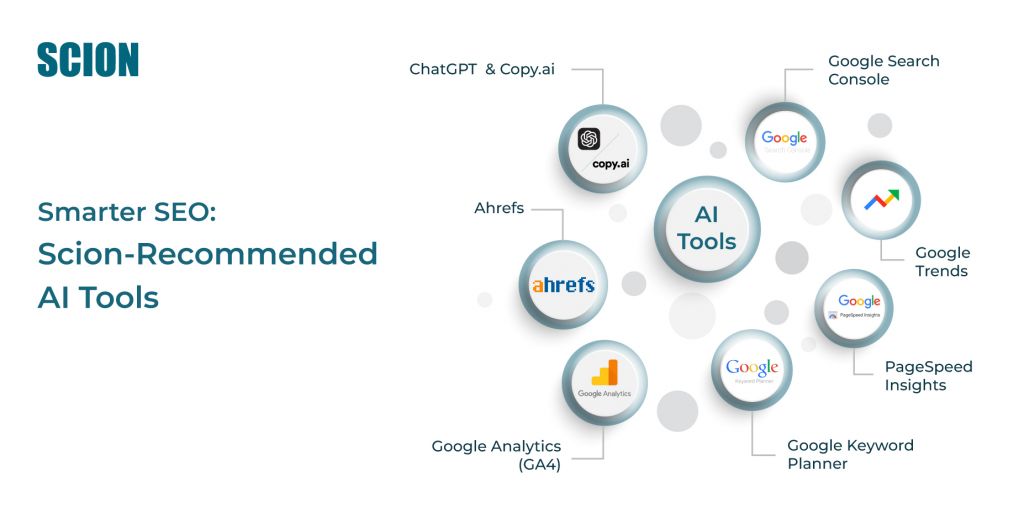
At Scion, we’ve taken a deliberate, data-backed approach to SEO focusing on both technical optimization and content strategy. After evaluating how search engines interpret and rank modern content, we implemented a series of updates to our website based on best practices and algorithmic insights.
Here’s a breakdown of the tools we’re using and how each has supported our SEO goals:
- ChatGPT & Copy.ai
These AI writing tools help us generate new content, rewrite existing copy, and ensure each page aligns with user intent and keyword relevance. ChatGPT assisted with structuring meta descriptions, FAQs, and dynamic page content, while Copy.ai helped streamline variations for CTAs and landing page text.
- Ahrefs
Our go-to for deep SEO audits, backlink analysis, and content gap detection. Ahrefs helped us uncover:
- Broken or redirected links
- Keyword opportunities our competitors were ranking for
- Thin content needing expansion
- New backlink prospects to improve authority
- Google Analytics (GA4)
With the new GA4 rollout, we’re now leveraging AI-powered insights, like predictive metrics (e.g., churn probability and likely conversion paths), to understand how users interact with our pages. This has helped us prioritize high-performing content and identify user behavior trends that inform future SEO actions.
- Google Search Console (GSC)
GSC provided essential data on indexing status, crawl errors, and query performance. We used it to monitor improvements in rankings after content updates and identify which pages were gaining traction in search.
- PageSpeed Insights
Speed matters – and we used PageSpeed Insights to diagnose and fix performance issues that were affecting our Core Web Vitals. From image optimization to code minification, this tool helped improve both mobile and desktop load times.
- Google Trends
We used Google Trends to explore rising keywords, seasonal trends, and regional search interests. This ensured our content stayed timely and aligned with what our audience was actively searching for.
- Google Keyword Planner
As part of our keyword research workflow, Keyword Planner gave us volume estimates and competition levels. We used it alongside Ahrefs to validate keyword choices and identify search terms with strong commercial intent.
The Results So Far
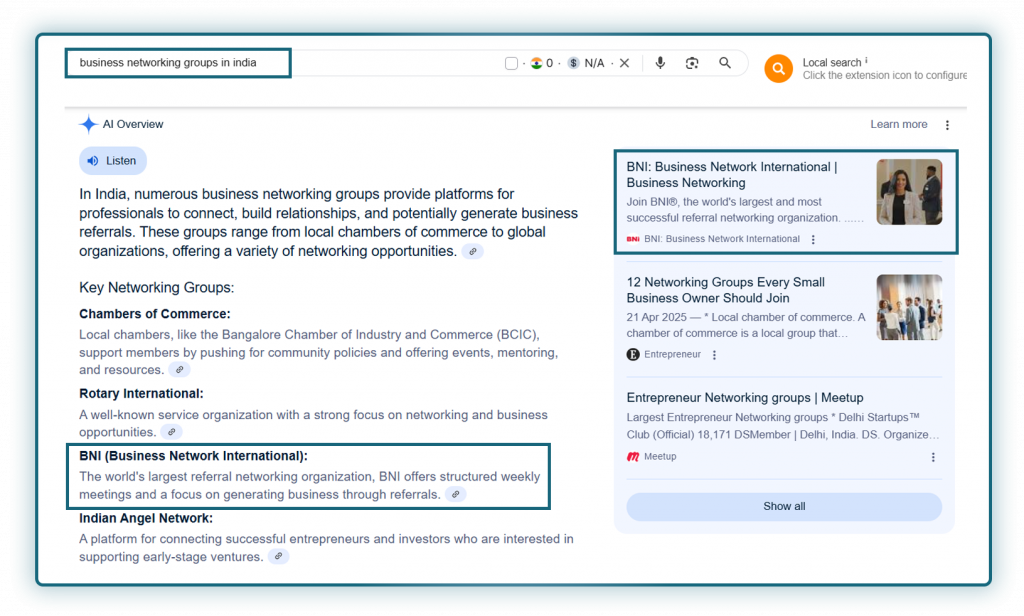
By using this combination of AI and analytics tools, we’ve made strategic updates to our existing content and early results are visible in the SERPs.
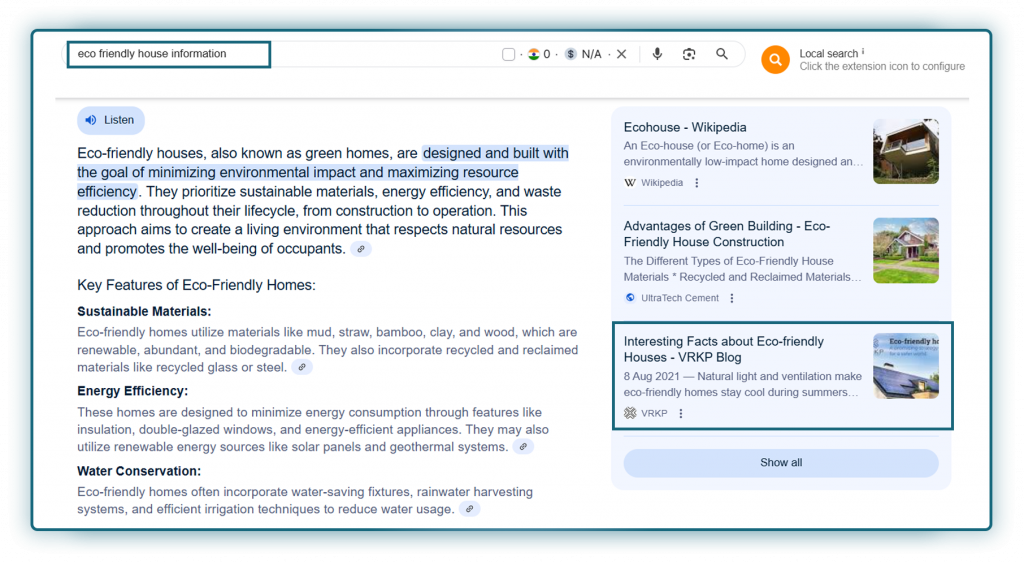
Pages are climbing in rankings, bounce rates have decreased, and our most important keywords are gaining visibility.
Conclusion: AI Is Your SEO Co-Pilot

AI isn’t here to replace marketers but to help them work smarter. It’s not about replacing human creativity or strategy – it’s about amplifying it.
Here’s a practical approach to integrating AI into your SEO workflow:
1. Start small
You don’t need to overhaul your entire tech stack overnight. Begin with one or two tools that align with your most immediate needs, whether it’s keyword research, content creation, technical audits, or UX improvements. For example:
- Use ChatGPT or Jasper to speed up blog writing or idea generation.
- Try Ahrefs or SEMrush AI for smarter keyword insights or SEO audits.
Starting small reduces overwhelm and helps you see real impact without a steep learning curve.
2. Measure results
Not every AI tool will be a game-changer, and that’s okay. What matters is tracking performance and measuring how each tool contributes to your goals. Ask questions like:
- Did organic traffic increase after using an AI content optimizer?
- Did your page speed scores improve after applying automated fixes?
- Are new keywords ranking after using AI-driven topic suggestions?
Use tools like Google Analytics 4, Google Search Console, and Ahrefs to track changes in rankings, user behavior, and conversions.
3. Scale what works
Once you identify which AI tools and tactics are delivering ROI, scale them. Automate repetitive tasks, repurpose high-performing content, and invest more in tools that help you move faster without sacrificing quality. For example:
- If AI-assisted outlines consistently lead to top-ranking articles, integrate them into your full content workflow.
- If automated audits from Ahrefs surface and help fix high-impact errors, set up recurring crawls across all key pages.
AI is the co-pilot, not the captain. Human marketers bring context, creativity, empathy, and strategic thinking that no algorithm can replicate. But AI can handle the heavy lifting, deliver deeper insights, and contribute to faster execution.
If you want to know the other trends shaping digital marketing in 2025, check out this video.
FAQ’s
AI improves SEO by automating repetitive, time-consuming tasks. For example, AI can analyze thousands of keywords in seconds, identify content gaps by comparing your pages to competitors, and flag technical issues that might hurt rankings.
It also helps structure content based on what’s currently ranking in the SERPs, making your pages more competitive. By handling data-heavy processes, AI frees up time to focus on high-impact activities like strategy, experimentation, and creative content development.
Several AI tools are now central to modern SEO workflows, each with a specific strength:
- ChatGPT & Jasper – Content generation, rewriting, and brainstorming ideas.
- SurferSEO & Frase – Content optimization based on real-time SERP data.
- SEMrush & Ahrefs – Keyword research, site audits, backlink analysis, and competitive tracking.
- Hotjar (with AI) – UX insights via heatmaps, scroll maps, and user behavior analysis.
- MarketMuse – Content strategy and gap analysis using topic modeling and AI scoring.
No, using AI to assist with SEO isn’t against Google’s guidelines, as long as the output is useful, original, and designed with users in mind.
Google has clarified that what matters is the quality and purpose of the content, not how it was created. If AI is used to produce keyword-stuffed, low-value, or duplicate pages purely to manipulate rankings, that violates policy. But if it’s used to assist in writing, editing, and structuring content that genuinely answers user queries, it’s acceptable, and even encouraged.
